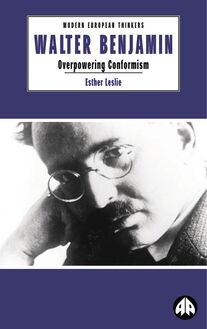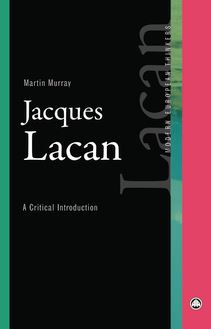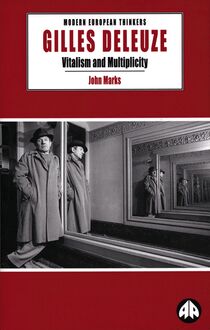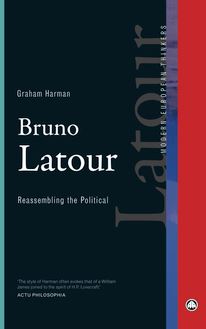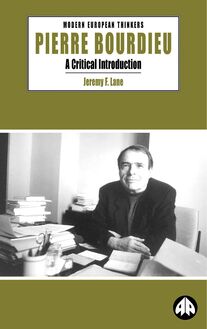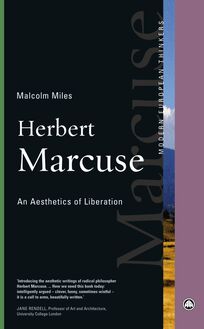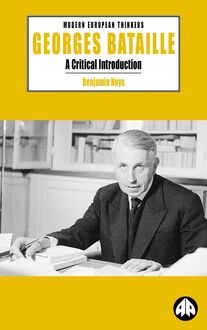Herbert Marcuse , livre ebook
132
pages
English
Ebooks
2011
Vous pourrez modifier la taille du texte de cet ouvrage
Obtenez un accès à la bibliothèque pour le consulter en ligne En savoir plus
Découvre YouScribe en t'inscrivant gratuitement
Découvre YouScribe en t'inscrivant gratuitement
132
pages
English
Ebooks
2011
Vous pourrez modifier la taille du texte de cet ouvrage
Obtenez un accès à la bibliothèque pour le consulter en ligne En savoir plus
Publié par
Date de parution
05 décembre 2011
Nombre de lectures
0
EAN13
9781783714995
Langue
English
Although Marcuse is best known as a critic of consumer society, epitomised in the classic One-Dimensional Man, Malcolm Miles provides an insight into how Marcuse's aesthetic theories evolved within his broader attitudes, from his anxiety at the rise of fascism in the 1930s through heady optimism of the 1960s, to acceptance in the 1970s that radical art becomes an invaluable progressive force when political change has become deadlocked.
Marcuse's aesthetics of liberation, in which art assumes a primary role in interrupting the operation of capitalism, made him a key figure for the student movement in the 1960s. As diverse forms of resistance rise once more, a new generation of students, scholars and activists will find Marcuse's radical theory essential to their struggle.
Introduction
1. Aesthetics and the Reconstruction of Society
2. The Artist and Social Theory
3. Affirmations
4. A Literature of Intimacy
5. Society as a Work of Art
6. The End of Utopia
7. The Aesthetic Dimension
8. Legacies and Practices
Notes
Index
Publié par
Date de parution
05 décembre 2011
Nombre de lectures
0
EAN13
9781783714995
Langue
English
Herbert Marcuse
Modern European Thinkers
Series Editors: Anne Beech and David Castle
Over the past few decades, Anglo-American social science and humanities have experienced an unprecedented interrogation, revision and strengthening of their methodologies and theoretical underpinnings through the influence of highly innovative scholarship from continental Europe. In the fields of philosophy, post-structuralism, psychoanalysis, critical theory and beyond, the works of a succession of pioneering writers have had revolutionary effects on Anglo-American academia. However, much of this work is extremely challenging, and some is hard or impossible to obtain in English translation. This series provides clear and concise introductions to the ideas and work of key European thinkers.
As well as being comprehensive, accessible introductory texts, the titles in the ‘Modern European Thinkers’ series retain Pluto’s characteristic radical political slant, and critically evaluate leading theorists in terms of their contribution to genuinely radical and progressive intellectual endeavour. And while the series does explore the leading lights, it also looks beyond the big names that have dominated theoretical debates to highlight the contribution of extremely important but less well-known figures.
Also available
Hannah Arendt
Finn Bowring
Alain Badiou
Jason Barker
Georges Bataille
Benjamin Noys
Jean Baudrillard
Mike Gane
Walter Benjamin
Esther Leslie
Pierre Bourdieu
Jeremy F. Lane
Gilles Deleuze
John Marks
André Gorz
Conrad Lodziak and Jeremy Tatman
Félix Guattari
Gary Genosko
Jürgen Habermas
Luke Goode
Guy Hocquenghem
Bill Marshall
Slavoj Žižek
Ian Parker
HERBERT MARCUSE
An Aesthetics of Liberation
Malcolm Miles
First published 2012 by Pluto Press
345 Archway Road, London N6 5AA
www.plutobooks.com
Distributed in the United States of America exclusively by
Palgrave Macmillan, a division of St. Martin’s Press LLC,
175 Fifth Avenue, New York, NY 10010
Copyright © Malcolm Miles 2012
The right of Malcolm Miles to be identified as the author of this work has been asserted by him in accordance with the Copyright, Designs and Patents Act 1988.
British Library Cataloguing in Publication Data A catalogue record for this book is available from the British Library
ISBN 978 0 7453 3039 6 Hardback
ISBN 978 0 7453 3038 9 Paperback
ISBN 978 1 8496 4704 5 PDF eBook
ISBN 978 1 7837 1500 8 Kindle eBook
ISBN 978 1 7837 1499 5 EPUB eBook
Library of Congress Cataloging in Publication Data applied for
This book is printed on paper suitable for recycling and made from fully managed and sustained forest sources. Logging, pulping and manufacturing processes are expected to conform to the environmental standards of the country of origin.
10 9 8 7 6 5 4 3 2 1
Designed and produced for Pluto Press by Chase Publishing Services Ltd Typeset from disk by Stanford DTP Services, Northampton, England Simultaneously printed digitally by CPI Antony Rowe, Chippenham, UK and Edwards Bros in the United States of America
Contents
Introduction
1 Aesthetics and the Reconstruction of Society
2 The Artist and Social Theory
3 Affirmations
4 A Literature of Intimacy
5 Society as a Work of Art
6 The End of Utopia
7 The Aesthetic Dimension
8 Legacies and Practices
Notes
Index
Introduction
In this Introduction I set out my aims in writing the book, its scope, and why I think that Herbert Marcuse’s writing is of interest today. I explain why I address his work on aesthetics rather than the wider project for a critical theory of society, sketch the book’s organisation, and finally say a little of the background from which I wrote it.
AIMS AND SCOPE
My aim is to increase interest in Marcuse’s writing on aesthetics. Although there has been a proliferation of commentary on the work of Walter Benjamin and Theodor W. Adorno – his contemporaries in the development of critical theory, both of whom also emphasised aesthetics – less has been published on Marcuse’s work. Benjamin’s essay on the work of art 1 has been used almost to exhaustion in courses on photography and media arts, and Adorno is seen as a more philosophically weighty contributor. Yet in the 1960s, when it seemed society might change, Marcuse’s writing reached a wider readership and evoked a more immediate engagement with the problems and potential benefits of a cultural revolt.
Marcuse died in 1979, after which a few books on his work were published. 2 But his theories then fell into neglect until publication of the Collected Papers began in 1998, 3 followed by a further few critical titles. 4 Yet the Collected Papers , edited by Douglas Kellner in collaboration with Peter Marcuse, show the depth of Marcuse’s insights into culture, and the consistency of his pursuit of an understanding of social change. At the time of writing, five of the planned six volumes are in print, and have been a key source for my re-reading of Marcuse’s work. Organised thematically, the Collected Papers juxtapose both well-known and hitherto unpublished material. But the Collected Papers will appeal to readers already interested in Marcuse’s work. I make no claim to compete with Kellner’s scholarly introductions to each volume, and aim instead to offer an introductory commentary relating specifically to Marcuse’s aesthetic theories.
An increasing tendency towards interdisciplinary work since the 1970s suggests that Marcuse’s effort to integrate social, cultural, political and psychoanalytic insights will be of methodological interest, too, across the arts, humanities and social sciences. His willingness to present seemingly opposed polarities – such as art’s social and aesthetic dimensions – as potentially creative tensions, is also interesting, in a period when both education and politics seem driven increasingly by a need for solutions. For the most part, Marcuse’s writing was work in progress, developed in the 1960s from one paper to the next as he spoke at student gatherings as well as academic conferences; ideas migrated, and questions were kept open. Andrew Feenberg, a colleague in the 1960s, recalls that Marcuse did not predict the revolution but elaborated ‘the conditions of its possibility’. 5 I read this as the necessary ground for an imaginative reconstruction of society, and the beginning of a longer project of realisation.
To introduce Marcuse’s writing on aesthetics is less difficult than, say, to comment on Adorno’s work with its long sentences and aversion to paragraph breaks, or to explain Ernst Bloch’s unrestricted eclecticism. When an interviewer suggested to him that his writing was ‘difficult to understand’, Marcuse replied that he regretted such difficulty, adding (in his German accent) ‘I try to write clearer’ and that he took comfort in the fact ‘that a few people do and did understand it’. 6 In fact, his most important texts are remarkably succinct: An Essay on Liberation 7 and The Aesthetic Dimension 8 are each less than a hundred pages long, and accessible. Marcuse’s philosophical and literary references are evidently drawn from the German philosophical tradition, and may now appear to be dated, but they are not intentionally obscure or obstructive. To me, what permeates a re-reading of Marcuse now is how radical and refreshing his ideas appear despite the lapse of time since their first publication.
I am, then, confident that this book will engage the interest of second- and third-year undergraduates in the arts, humanities and social sciences; and graduates in areas such as cultural policy, radical philosophy, and research between culture and the political sciences. It may also be relevant to the professional practices of artists, planners and policy makers seeking to look beyond a society governed by the notion that there is no alternative to the way things are. New social movements have proclaimed that a new society is possible; Marcuse’s theories link the possibility to a careful reordering of the implicit values of the existing society, and a robust indication of its contradictions.
WHY READ MARCUSE NOW?
Marcuse’s aesthetic theories were contextualised by the political realities of the 1930s (the rise of fascism), the 1960s (the counterculture), and the 1970s (the aftermath of the failed revolt of 1968). Marcuse did not think that history repeated itself; yet if freedom was only a dream in the 1930s, against totalitarianism, and became a dream again in the 1970s (as now) in face of the rise of globalised capitalism, it is appropriate to recall the interlude of hope which occurred between these dire outlooks. Marcuse wrote in 1972 that, ‘In its extreme manifestations, it [the capitalist system] practices the horrors of the Nazi regime.’ 9 William Robinson writes that ‘Transnational capital and its political agents are attempting … a vast shift in the balance of class and social forces worldwide to consolidate the neo-liberal counterrevolution of the 1980s.’ 10 I do not equate advanced capitalism and the Nazi state, but the extent to which neo-liberalism and earlier forms of totalitarianism seek total control of society – now by the soft forces of consumerism and culture – implies that a common form of analysis is needed. But does this include aesthetics? Marcuse argued in The Aesthetic Dimension that a concern with aesthetics is justified when political change appears remote. Today, the sporadic growth of new political formations in single-issue campaigning and activism inspires hope, but this is too easily marginalised. Now is an appropriate time, then, for a critical reconsideration of the optimism of the 1960s which Marcuse reflected in his writing. The prospect of a new society was (and might still be) electrifying and contagious, a force to interrupt – and rout – the notion that world history has a single, given course.
For Marcuse, as for Bloch, to imagine another form of society is to begin the process of its
